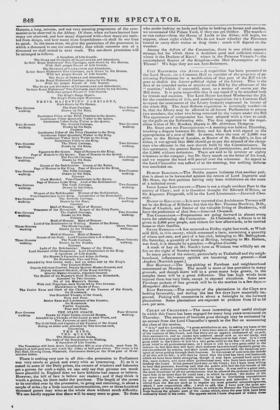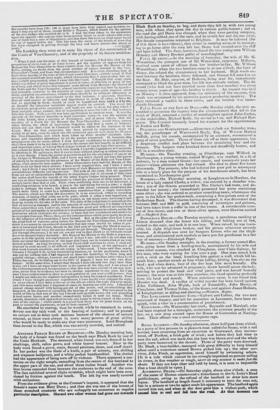COURT or CHANCERY.—The most interesting and useful sittings in which
this Court has been engaged for many long years terminated on Thursday. The amount of business gone through may be estimated by an extract from the Lord Chancellor's speech to the Bar on announcing the close of the session.
" It is," said his Lordship, " a great satisfaction to me, in taking my leave of the Bar and of the suitors, to know that I have been able to dispose of all the arrears of the business of this Court, and that there are no appeals undisposed of, no peti- tions unanswered, and no causes now unheard, except such as are not ready, and which have been put upon the flies of the Court subsequent to last June. It is a very great relief to the Court—it will be a very great relief to the Bar—it will be a very great relief to all professional men, as I know it will be a very great relief to the suitors—to feel that they will have their business henceforward regularly going on, not encumbered by arrears, and their minds not oppressed with the harassing pro- spect of never getting through their business. In the course of next term the benefit of all this will be felt ; it will then be found that the time has been well bestowed, which we have been lately occupying, though it may have pressed hard upon the Bar, upon suitors, and upon other professional men, who have been anxiously at- tending the Court. It has pressed hard also on the Court ; but I have been willing to bear that pressure, knowing well that the public will feel the full benefit of the more than ordinary exertions which have been made. It was said to a great man, the most illustrious of all my predecessors, that he allowed the pressure of business upon him to be more than he could bear ; to which he replied, 'the duties of life are more than life,'—memorable words, to be bad in everlasting remembrance by all men who serve their country. The kindness and attention I have re- ceived from the Bar are such as to require my most grateful acknowledgments, which I now respectfully offer. 1 wish to add, that I have now the most san- guine hopes of being able, for the future, to relieve his Honour the Vice-Chancellor from hearing the greater part of the causes which, since the year ISIS, have been ordinarily heard in his court. The appeals which I have disposed of within these
few months have been 120 108 of these have been fully argued and decided—in- deed I may say all of them, except Miller v. Travers, which stands for the opinion of the two Judges who assisted me in it. I find the time taken in the arguments upon the appeals—the average time being several hours to each—shows that every one of them was a case of importance, and that there has been no short cause heard by way of appeal before me. This has been the cause of the length of time that has been occupied in getting through the long and heavy arrear—the of years."
His Lordship then went on to state his views of the construction of the Court of Vice-Chancery, and of the propriety of its future modifica-
tion.
" When I look into the state of this branch of business, I find also, that in the proportion of six to four, or of three to two, are the number of appeals from his Honour the Vice-Chancellor to those coming from his Honour the Master of the Rolls, arising, no doubt, from the great number of causes decided in the Vice- Chancellor's Court, and from that circumstance only. It is clear, therefore, that at least three months of the time of this Court would have been entirely saved if that arrangement could have been made, which (foreseeing this) I propouaded, but un- successfully propounded, when I came into the Court. I thought that every cause which was either of great importance in point of value, or difficulty in point of law or of fact, and which in the first instance came before their Honours the Master of the Rolls and the Vice-Chancellor, almost inevitably found its way here by appeal— and generally, certainly in the majority of cases, only led to great expense, great delay, and great inconvenience, whether there should be an ultimate affirmance ur reversal of the decree pronounced in the first instance. I proposed, therefore, that all such causes of difficulty and importance in point of value, or from the law as applying to them, should at once be transferred here and h a d by me, as thereby the otherwise inevitable appeal would be averted. The event has justified my prospective conjecture, and leads me now to form the plan which I shall certainly adopt, namely, that of transferring at once the bulk of that business into this Court. Such a result was long ago foreseen by eminent men. It was the opinion of Sir Samuel Romilly—a most venerable name—it was the opinion of
Sir John Leach, then a member of Parliament, and of many others, that the erection of a Court for his Honour the Vice-Chancellor, would have, among
other things, the effect of increasing litigation, and that a mass of business which did not then exist in Chancery would be added to the business of the Court. How far that conjecture has been proved by experience, must be visible to all men, since 64 out of the 108 contested appeals were from his Honour the Vice-Chancellor, and which have taken up three months' constant, labo- rious, and expensive attendance to all the parties concerned. If, however, this arrangement can be made, which I look forward confidently to accomplishing, I shall then deem it to be my duty to give to the suitors the full benefit, in all difficult and important cases, of having three judges instead of one to hear their causes. If this cannot be done by the law as it now stands, I trust the Legislature will assist me in effecting it. My opinion is, that it can be thane without altering or adding to the law us it now stands. I have the power at present to ask for the attendance of any or all the Judges in Westminster Hall; andl know not why I should not have the power of asking to be assisted by the presence of the Master of the Rolls and Vice-Chan- cellor, when necessity may require. Other Chancellors have had the Master of the Rolls to sit for them when absent; I have never required that, and I trust I never shall ; but I think I may have the assistance of their Honours on hearing cauies of extraordinary difficulty and importance. The bulk of the cases that are appealed from are not of extraordinary difficulty or importance, but in all cases of that class
the suitor shall have the benefit of the other. Equity Judges being present. There are two or three branches of judicature in which the presence of three judges is in-
finitely better than that of one. First, when conflicting facts are to be discussed, a conflicting evidence to be heard, a jury is the best forum for such a case ; a single judge is perhaps the worst ; but three men with minds variously constituted are much more likely to come to a satisfactory conclusion than a single individual. The next is, Where any thing like discretion is to be exercised, either in awarding damages, or'saying what costs are to be paid ; which is often a very important, or net unfrequently difficult and delicate inquiry, as too many cases are brought and kept up merely for the sake of the costs. The duty of the judge there is somewhat like that of assessing damages, and in the exercise of such discretion it is better to have three judges than one. Last of all, where there are great and difficult and important points of law and equity to be settled, it is much more satisfactory to suitors, and to the profession which cultivates the science, to have that law considered and settled by more judges than one. These, then, are the considerations which principally move me to the adoption of the resolution I have formed. But, at the same time that I stop the great bulk of business going before his Honour the Vice-Chancellor, I shall not deem it necessary to recommend elsewhere that any steps should be taken at pre-
sent to terminate his Court, though in the 53rd year of George the Third it was ex- pected it would end when the arrears should be got through. Though we have now got through the arrears, I do not yet see nry way to that which as an ultimate result
must be deemed highly desirable. His Honour the Master of the Rolls is more sun. guine as to the speedy accomplishment of it than I am : but still I do not shut out from my mind the indulgence of the hope that I may see its termination at no very distant period. As long, however, as that Court shall continue to exist, I shall en- deavour to avail myself, in all difficult and important cases, of the assistance of that most learned, excellent, and able judge, in this court. I have said thus much, because I thought it fit, before terminating business, to let the profession know it was not for nothing that I had imposed on them the hardships of these long and painful sittings ; sittings, however, not much later—only two days later—than Lord Eidon has sat, for he having sat to the 29th of August, I have sat only two days longer. At the same time, I admit that though I have sat only two days later than usual, yet I have sat many more hours in the course of the day, and I am aware of the embarrassments and inconveniences that this may have caused—I am not, how- ever, aware that its tendency has been to abridge arguments in any case, for I am sure I have endeavoured to show as much patience as any man could possess. that I might not indicate the slightest indisposition to hear the longest arguments. Even where I have thought argument superfluous, I have hardly ever stopped the reply, in cases where I have been in favour of the side on which the reply was to he made, and still more rarely have I disposed of cases on hearing one side only. I therefore cannot charge myself with having got rid of this arrear, and accomplishing this despatch, at the expense of curtailing the hearing of causes. The best proof in the world of this is, that one of the last I heard took up eight hours, the one preceding it took seven hours, and another immediately before it took six hours. Three causes, therefore, took upwards of twenty-one hours in being argued at the conclu- sion of the sittings ; which surely is a proof that there was no great desire on my part to curtail the arguments, or not to hear counsel."
He concluded• by stating, that he would, while he remained in town, devote one day each Week to the hearing of motions ; and he pressed on suitors not.to delay such motions because of the absence of certain counsel, as there were always in town many persons of great ability who would be ready to make any that were necessary. Lord Brougham then bowed to the Bar, Which was excessively crowded, and retired.



























 Previous page
Previous page